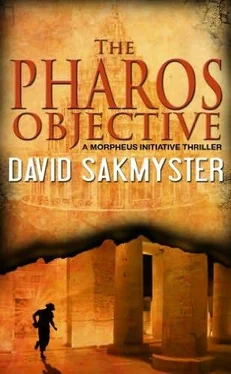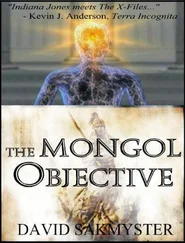David Sakmyster - The Pharos Objective
Здесь есть возможность читать онлайн «David Sakmyster - The Pharos Objective» весь текст электронной книги совершенно бесплатно (целиком полную версию без сокращений). В некоторых случаях можно слушать аудио, скачать через торрент в формате fb2 и присутствует краткое содержание. Жанр: Прочие приключения, на английском языке. Описание произведения, (предисловие) а так же отзывы посетителей доступны на портале библиотеки ЛибКат.
- Название:The Pharos Objective
- Автор:
- Жанр:
- Год:неизвестен
- ISBN:нет данных
- Рейтинг книги:3 / 5. Голосов: 1
-
Избранное:Добавить в избранное
- Отзывы:
-
Ваша оценка:
- 60
- 1
- 2
- 3
- 4
- 5
The Pharos Objective: краткое содержание, описание и аннотация
Предлагаем к чтению аннотацию, описание, краткое содержание или предисловие (зависит от того, что написал сам автор книги «The Pharos Objective»). Если вы не нашли необходимую информацию о книге — напишите в комментариях, мы постараемся отыскать её.
The Pharos Objective — читать онлайн бесплатно полную книгу (весь текст) целиком
Ниже представлен текст книги, разбитый по страницам. Система сохранения места последней прочитанной страницы, позволяет с удобством читать онлайн бесплатно книгу «The Pharos Objective», без необходимости каждый раз заново искать на чём Вы остановились. Поставьте закладку, и сможете в любой момент перейти на страницу, на которой закончили чтение.
Интервал:
Закладка:
Helen held up one last drawing. “Then there’s mine,” she said, “which, admittedly, is biased, since I know the ultimate target.”
“True, so while we can’t count yours as a valid blind experiment, it’s telling nonetheless.” Waxman gave her a light pat on the shoulder.
Caleb narrowed his eyes, then tried to focus on his mother’s picture. She had drawn a series of doors, one after another. Seven in total, with some kind of dog or jackal standing guard before each one. But what pulled his eye was something she had drawn in the upper corner, away from the doors.
He stood, reached over Helen’s shoulder and snatched the sheet from her. He held it up, staring at the smaller image of a crudely drawn mountain, its top blown off. Jagged lines rolled down its sides toward two separate sites that looked like domed houses, one on each side of the mountain.
Waxman was frowning. “What are you doing?”
Helen tried to grab it back from him. “Honey,” she said, “just sit and listen for now.”
“I know what this is,” Caleb said, and the room quieted down. He stumbled forward, took a piece of tape and stuck her picture on the wall, overlapping Tom and Victor’s drawings.
“Looks like a volcano erupting,” said Dennis, chewing into a Mars Bar.
“It is.” Caleb glanced back to the drawing and he pointed to the rightmost pillared structure threatened by the zigzagging lava flow. “Mom, what is this you’ve drawn over this house?”
Her face reddened as everyone looked at her. “A book,” she said at last.
Caleb smiled, took a step back and sat down. “In my fever, I had a dream.”
Waxman and Helen both sat quietly, inching forward. Caleb expected one or both to tell him to be quiet, to let them get on with their important analysis and the next phase of the experiment, but in their stunned silence, he continued. “I know what she’s drawn. I know what the caduceus represents and how it relates to the treasure.”
“Treasure?”
“In a minute, Dennis.” Helen snapped her chewing gum. She leaned back in her chair, crossing her arms. “Okay, Caleb. Go ahead, enlighten us.”
Caleb pointed to Helen’s drawing. “Vesuvius. It erupted in seventy-nine AD, burying both Pompeii and Herculaneum.” He indicated the two houses she had drawn, believing she had intended them to represent two distinct cities. “It happened so fast that people died in their sleep or even walking on the street. All the buildings were encased in seventy feet of volcanic ash and mud, and buried until excavators rediscovered the city by accident in the eighteenth century.”
“Lava!” Dennis exclaimed. “I knew it. I-”
“We all know about Vesuvius.” Waxman coughed and lit up another cigarette. “How does this information help us?”
“My mother drew a book over one of the cities.”
“And…?” Helen led, getting annoyed.
Caleb’s voice faltered a little. Am I on the right track? Everyone was looking at him, and he was sure, with the exception of Waxman, that none of the others believed he had any real psychic abilities, let alone that he shared their vaunted remote-viewing powers. He gathered his confidence. “She drew a book. That’s the key. The key to the doors, the gates, the caduceus-in short, everything the rest of you have drawn.”
“What do you mean?” Waxman leaned forward. Caleb could see the bright blue of his eyes, and he imagined that something black slithered and crept behind them, patiently waiting for a moment to strike. He had the sudden impression that Waxman knew exactly what Caleb was talking about, and was simply hiding it from these people, waiting to see what they could find out on their own.
Caleb took a deep breath. “There was a large personal library in Herculaneum. With few exceptions, such as at Athens or here in Alexandria, most libraries in those days were the possessions of wealthy individuals with a passion for collecting books. The library at Herculaneum belonged to a man named Lucius Calpurnius Piso.”
Someone coughed. Others looked around the table.
“Who was he?” Helen asked at last. She leaned forward in her chair, and her eager eyes met his.
Caleb let the question hang for a moment. When no one else answered, he said, “He was the father-in-law of Julius Caesar.”
Around the room interest piqued, but still the blank stares remained. Nina seemed to be watching him more intently, hungrily even, and it took all of Caleb’s willpower to pull his eyes away from hers.
He took another breath. “In my dream I saw Caesar flee the lighthouse, holding papers he had stolen from its keepers.”
Helen stood up. “Did you see the caduceus? The snakes wrapped around a staff?”
“Carved on a door, about eight feet high. It’s the symbol of Mercury, by the way, of Hermes, and before that the Egyptian equivalent, Thoth.”
“God of Medicine,” Waxman said, eyes beaming.
“And writing,” Caleb added. “They believed he was the one who gave language to mankind and taught us everything from astronomy to medicine and farming. He also counseled the other gods and judged the dead. And it was rumored that he put all of this knowledge into a series of books, the greatest of which he called the Emerald Tablet. ”
The room was quiet, so quiet that Caleb could hear his heart thudding against his ribs. Everyone was looking at him through the haze of smoke.
Helen cleared her throat. “So Caesar may have taken some kind of important papers from the Pharos Lighthouse?”
“Yes,” Caleb answered, his voice cracking. “And unable to decipher the cryptic words and symbols drawn by the lighthouse keepers, he ordered the scroll sent to the library at Herculaneum. His father-in-law’s library. With all of his attention then focused on Rome and other various campaigns, he forgot all about it, and those papers were still there when Vesuvius erupted.” He glanced around at his attentive audience. “Anyway, it could’ve happened that way.”
Waxman was grinning like Caleb had never seen anyone grin. “ The Villa of the Papyri! Found in the 1750s as workers tunneled under Herculaneum. A team of archaeologists have been trying to open and restore the scrolls recovered from the volcanic rock for years.”
Caleb triumphantly sat down and returned his mother’s glowing smile. A sinking feeling nagged at him, though, tugging at his victory. How did Waxman know about Piso’s library? From what Caleb understood of his background, Waxman was a mathematics teacher from Cleveland who had begun a project to document paranormal abilities after receiving visions of his dead mother. His published articles had caught the eye of an archaeological team pursuing sunken ships in the Caribbean, and he had formed a group of like-minded psychics, people like Helen, who had scored well on such tests. Despite all his worldly experience, book smarts never appeared to rank high on his resume, although somehow he had managed to come up with a fitting name for the team, as Morpheus was the lord of dreams, whose mother was the goddess of visions.
Now, at Waxman’s direction, the room burst into a frenzy of activity, of discussions and revelations. Helen and Waxman set about explaining to the others the nature of the real subject, filling them in on the Pharos Lighthouse and the supposedly hidden chamber below.
“We know now what the visions are showing us: there’s a sealed door with the sign of the caduceus on it, and there are seven symbols around the staff, which might represent seven keys or puzzles to solve before the door can be opened.”
The next phase, Waxman said, would be to see if there was anything at Herculaneum that could help them. “We know that a series of earthquakes destroyed the bulk of the Pharos, with the last great quake in 1349 toppling what was left.”
Читать дальшеИнтервал:
Закладка:
Похожие книги на «The Pharos Objective»
Представляем Вашему вниманию похожие книги на «The Pharos Objective» списком для выбора. Мы отобрали схожую по названию и смыслу литературу в надежде предоставить читателям больше вариантов отыскать новые, интересные, ещё непрочитанные произведения.
Обсуждение, отзывы о книге «The Pharos Objective» и просто собственные мнения читателей. Оставьте ваши комментарии, напишите, что Вы думаете о произведении, его смысле или главных героях. Укажите что конкретно понравилось, а что нет, и почему Вы так считаете.












